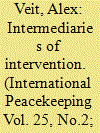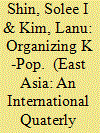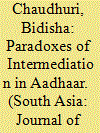|
|
|
Sort Order |
|
|
|
Items / Page
|
|
|
|
|
|
|
| Srl | Item |
| 1 |
ID:
149905


|
|
|
|
|
| Summary/Abstract |
The UK market for energy service contracts is expanding, owing in part to the emergence of intermediaries for those contracts in different parts of the public sector. These intermediaries combine a legal framework for establishing contracts with an organisational framework that facilitates contract negotiation and execution. This paper examines the nature and operation of these intermediaries in more detail, including their achievements to date and their similarities and differences. It uses ideas from transaction cost economics to develop a theoretical model of the contracting decision and shows how intermediary organisations can lower the transaction costs incurred by both clients and contractors, thereby increasing the viability of contracting. The paper argues that intermediaries can play an important role in expanding the market for energy service contracts, and hence in delivering cost-effective energy efficiency improvements throughout the public sector.
|
|
|
|
|
|
|
|
|
|
|
|
|
|
|
|
| 2 |
ID:
188559


|
|
|
|
|
| Summary/Abstract |
Load management is the practice of adjusting demand in an electricity system through remote control of—or incentives to operate—grid-edge technologies in alignment with system goals. Although load management functions as a distributed energy resource (DER) and can play a critical role in cost-effective deployment of renewable energy toward economy-wide deep decarbonization, there has been little energy transitions research on how electric grid actors initiate and manage DER deployments over time. We use interviews and archival research to compare case studies of electric cooperatives in the United States, tracing how cooperatives deployed more than 600,000 load management devices over 70 years. Using polycentricism as a frame, we find that DER deployments comprise common pool resources that are strategically created and negotiated across scales by different centers of decision-making over time. Our findings rebut the assumption that DER deployments are solely the result of policies or markets, showing that DER deployments are instead polycentric acts of cooperation and competition. DER deployments require diverse intermediaries within and across levels of deployment, from policy to users, over many years. We show that polycentric governance that builds vertical coordination across local and regional actors can support broad, deep, and distributed energy transition.
|
|
|
|
|
|
|
|
|
|
|
|
|
|
|
|
| 3 |
ID:
166981


|
|
|
|
|
| Summary/Abstract |
Comprehensive energy retrofits by households and housing companies have been recognised as important means for emission reductions. However, the diffusion of comprehensive energy retrofits has not been as fluent as expected. In this article, we study the Finnish energy retrofit market and comprehensive energy retrofit acquisition process through participant observation and interview methods in order to better understand the work that housing companies, as potential adopters, must carry out. The results of our study suggest that to operate in the current market, adopters must expend a considerable amount of effort in finding market actors, understanding the offerings and coming to grips with what kind of energy system would be ideal for their site. Only a handful of market actors are able to help adopters in this work and even these were difficult to locate due to their position in the energy retrofit market ecology. The study indicates that future policy should foster matchmaking between potential adopters and energy counselling services and support tighter collaboration between public and private energy sector actors.
|
|
|
|
|
|
|
|
|
|
|
|
|
|
|
|
| 4 |
ID:
150719


|
|
|
|
|
| Summary/Abstract |
The likely installation of, and potential energy savings from, low carbon technologies in domestic buildings is not only dependent on those who fit them, but also the broader supply chains of which they are part. Despite this, the role of supply chain actors has been largely overlooked in strategies seeking to encourage the installation of more sustainable domestic heating technologies. With reference to central heating, this paper responds through an ethnographic analysis of how plumbers' merchants and sales representatives can influence the work of heating installers in the United Kingdom. It applies two dimensions of the concept of ‘social capital’: relational and structural. Relational social capital focuses on the trust, loyalty and reciprocity at play in relations, whilst structural social capital considers how the strength of tie can influence those to whom people turn for advice and support. Together, these ideas demonstrate how relationships amongst these groups can serve to influence product choice and facilitate information exchange. The paper concludes by discussing how these supply chains might be engaged with as a means of encouraging the installation of low carbon domestic technologies.
|
|
|
|
|
|
|
|
|
|
|
|
|
|
|
|
| 5 |
ID:
146649


|
|
|
|
|
| Summary/Abstract |
In the past, studies on inclusive development involve mainly the perspective of equitable distribution of economic and societal outputs. This study, however, takes a different approach and analyses the potential roles of regional coordination mechanisms (RCMs), specifically universities and research council's networks within Southeast Asia, in disseminating the innovation-related activities for inclusive development or Innovation for Inclusive Development (IID). The literature on innovation intermediaries within the realm of innovation systems studies was used to establish the framework of the study. The findings indicate that RCMs have a huge potential role to play. However, due to a number of reasons, including lack of funding support, lack of attention and commitment to IID, weak engagement with industry and non-governmental organisations, the implementation of the IID activities was rather poor. As a whole, the study argues that current approaches are not well positioned and it is fragmented preventing the effective use of RCMs despite their potentials for IID efforts. The study attributes this to the systemic failures in the regional coordinating systems. In enhancing the role of RCMs in IID, this study recommends the promotion of IID platform, the leveraging of non-government organisations and industry as well as energising the Southeast Asia engagement in promoting IID.
|
|
|
|
|
|
|
|
|
|
|
|
|
|
|
|
| 6 |
ID:
158108


|
|
|
|
|
| Summary/Abstract |
Why do international peace- and state-building interventions regularly fail to transform conflict-ridden countries into liberal states? This paper argues that interventionists’ practices and dependency on local intermediaries help explain the disappointing outcomes of intervention. Based on a relational theoretical approach and original empirical material, the paper compares two of the largest peace- and state-building interventions in recent years. For practical and normative reasons, peacebuilders need to find local partners who help them instil change. However, as partners of peace- and state-building interventions, local elites may appropriate international resources and use them to strengthen their own positions. Interventionists abstain from sanctioning such appropriation as long as their own short-term and purpose-oriented goals are not undermined. Contrary to assumptions in much of the literature, interventionists do not eagerly defend their alleged liberal agendas. Instead, their pragmatism strengthens existing neo-patrimonial figurations rather than fostering fundamental transformation. The paper argues that research should focus on peacebuilders’ actual practices rather than normative statements. Such an approach allows for a better understanding of evolving political orders in conflict societies.
|
|
|
|
|
|
|
|
|
|
|
|
|
|
|
|
| 7 |
ID:
126969


|
|
|
|
|
| Publication |
2013.
|
| Summary/Abstract |
This paper studies the connection between the emergence and market making activities of the large Korean entertainment houses and the global level success of "K-pop," an increasingly popular type of Korean popular music. We review a set of conventional explanations, respectively pointing to cultural factors, government support, and technological development as core factors that led to the global success of K-pop. We find all three explanations unsatisfactory and, alternatively, building on studies of market intermediaries, argue that the roles of three large entertainment houses-SM Entertainment, YG Entertainment, and JYP Entertainment-have been the most crucial in the development and success of K-pop. Through combining data from Korean music charts, newspaper articles, and revenue data, we trace the increasingly systematic musical production strategies of the entertainment houses and the macro-consequences of their organizational activities.
|
|
|
|
|
|
|
|
|
|
|
|
|
|
|
|
| 8 |
ID:
167102


|
|
|
|
|
| Summary/Abstract |
E-governance projects in India are often purported to minimise the role of human intermediaries. They rely on machines to curtail corruption and bring more efficiency to service delivery. However, studies have found human intermediation and its affordances to be crucial, especially in developing countries where social endowment gaps pose considerable barriers to the effective use of information and communication technologies. Human intermediation in technological infrastructure is thus invisible yet inevitable. I unravel this paradox of intermediation by examining the everyday practices of two sets of intermediaries in Andhra Pradesh and Rajasthan associated with everyday workings of Aadhaar, India’s digital biometric identity infrastructure. Looking at biometric technologies as ‘situated practice’, I draw on the notion of ‘infrastructuring’ to argue that the discretionary practices of human intermediaries in fact stabilise the technological system, anchoring it to a human infrastructure. So, as disruptive technologies such as Aadhaar are implemented, their effective usage will invariably rely on the potential agency of human intermediaries and their collaborative work practices.
|
|
|
|
|
|
|
|
|
|
|
|
|
|
|
|
| 9 |
ID:
183083


|
|
|
|
|
| Summary/Abstract |
Since the Paris Agreement of 2015, 195 countries, including Belgium, have committed themselves to keep the earth from becoming warmer than 1,5 °C since pre-industrial levels. By building and renovating in a more sustainable way, greenhouse gasses can be contained. Previous studies already demonstrated the influence and decisive role of the individual homeowner in energy retrofitting. Recent research highlights that energy efficient renovations are not a solo slim game by the homeowner itself, but a collaboration between various intermediaries and the homeowner. By conducting in-depth interviews, with a focus on the installation of heat pump technology, we identified a series of drivers and barriers that intermediaries experience when installing heat pumps. These drivers and barriers where structured and analyzed according to the “Alphabet theory-framework”. As a result, this paper provides four concrete propositions that can be applied by policymakers that face similar challenges in the transition to climate neutral buildings: (1) Intermediaries should be aided and supported in recommending heat pumps to private homeowners, (2) Inform, guide, and sensitize intermediaries about up-to-date heat pump installations, (3) Sensitize homeowners by providing non-complex information in a centralized and accessible place, (4) Facilitate knowledge transfer between intermediaries who offer their services to the same consumers, transcending time.
|
|
|
|
|
|
|
|
|
|
|
|
|
|
|
|
|
|
|
|
|